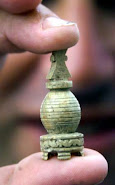OCTOBER 23, 2010
Still Under Cleopatra's Spell
The Romans were the first, but hardly the last, to be unnerved by female ambition, authority and allure.
By STACY SCHIFF
 |
| The Death of Cleopatra, by Guido Cagnacci, 1658. Note 17th c. style throne, costumes and hairdos! |
Shakespeare and G.B. Shaw lent a hand in her immortality, of course, as did Cleopatra's eloquent Roman critics. She endures for reasons beyond the fame and talent of her chroniclers, however; the issues that she raised continue to fluster and fascinate. Nothing enthralls us so much as excessive good fortune and devastating catastrophe. As ever, we lurch uneasily between indulgence and restraint. Sex and power still combust in spectacular ways.
And we remain unnerved by female ambition, accomplishment and authority. The wise woman mutes her voice in order to maintain her political or corporate constituency. She is often cast all the same as a scheming harridan or a threatening seductress. Her clothing budget attracts uncommon scrutiny, by definition either too large or too small. If she is not overly sexual, she is suspiciously sexless.
For reasons that remain murky, Julius Caesar invited Cleopatra to Rome in 46 B.C. Though her fortune had dwindled from that of her forebears—she was the last of the Ptolemies, the Greek dynasty that ruled in Egypt after the death of Alexander the Great—she remained the richest person in the Mediterranean world. A decade earlier, her father had traveled about Rome on the shoulders of eight men and with an escort of 100 swordsmen. He distributed lavish gifts left and right. There is little reason to believe that Cleopatra did things differently. The pageantry unsettled, as will a convoy of Maybachs in Paris today.
In the late republic, that outsized wealth impugned her morals. To wax eloquent about someone's embossed silver, sumptuous carpets or marble statuary was to indict him. In the Roman view, Cleopatra quite literally possessed an embarrassment of riches. This meant that every evil in the profligacy family attached itself to her. Well before she became the sorceress of legend—a reckless, careless destroyer of men—Cleopatra was suspect as a reckless, careless destroyer of wealth. Even if she never melted a pearl in vinegar, as legend has it, she could well afford to do so.
Cleopatra's fortune derived from Egypt's inexhaustible natural resources. Her kingdom was miraculously, effortlessly fecund, the most productive agricultural land in the Mediterranean. Its crops appeared to plant and water themselves. Those harvests—and Egypt's absolutist government—accounted for the Ptolemaic fortune. Very little grew in or left Egypt without in some way enriching the royal coffers. And Cleopatra controlled the greatest grain supply in the ancient world. Rome stood at her mercy. She could single-handedly feed that city. She could equally well starve it if she cared to.
Wealth and culture also happened to share an address in Cleopatra's lifetime. Compared to Alexandria, Rome qualified as a provincial backwater. It was still the kind of place where a stray dog might deposit a human hand under the breakfast table, where an ox could burst into the dining room. Alexandria remained the fashion capital, the center of learning, the seat of culture. If you wanted a secretary, a tutor or a doctor, you wanted one trained in Egypt. And if you wanted a bookstore, you dearly hoped to find yourself in Alexandria.
By contrast, it was difficult to get a decent copy of anything in Rome, which nursed a healthy inferiority complex as a result. Gulping down his envy with a chaser of contempt, a Roman found himself less awed than offended by Egypt. He wrote off extravagance as detrimental to body and mind, sounding like no one so much as Mark Twain, resisting the siren call of Europe many centuries later. Staring an advanced civilization straight in the face, the Roman dismissed it as either barbarism or decadence.
Egypt confounded as well for its exoticism. Nothing so much proved the point as the perceived femininity of the East, that beguiling, voluptuous realm of languor and luxury. There was something subversive about a land that exported a female goddess—the Isis temples in Rome were notorious spots for assignations—and a female pharaoh.
In Egypt, on the other hand, competence regularly trumped gender. Cleopatra followed to the throne a sister who had briefly succeeded in deposing their father. She could look to any number of female forebears who had built temples, raised fleets, waged military campaigns. And she came of age in a country that entertained a singular definition of women's roles. They inherited equally and held property independently. They enjoyed the right to divorce and to be supported after a divorce. Romans marveled that in Egypt female children were not left to die. A Roman was obligated to raise only his first-born daughter. Egyptian women loaned money and operated barges, initiated lawsuits and hired flute players. They enjoyed rights women would not again enjoy for another 2,000 years.
Not only was a Roman woman without political or legal rights, she was often without a personal name. Caesar had two sisters, both named Julia. A good woman was an inconspicuous woman, something that rather defied Cleopatra's training. As ever, what kept a woman pure was the drudge's life, of which Juvenal supplied the traditional formula: "Hard work, short sleep, hands chafed and hardened" from housework. For the Romans, a world ruled by a woman was a world turned upside down; like the north-flowing Nile itself, it reversed the course of nature. Female authority was in Rome a meaningless concept. This posed a problem for an Egyptian sovereign.
Cleopatra spoke many languages, flattery perhaps most fluently. Though famed for her charm and her powers of persuasion, she did not always temper her style. She was an autocrat who very much sounded the part. Few resented her tone as deeply as her Judaean neighbor, Herod the Great; the relationship between the two sovereigns proceeded by mutual betrayals. Complicating their dealings was each ruler's friendship with Rome, the western superpower intent on maintaining peace between them. (Herod owed his crown in part to Roman fears of Cleopatra; he balanced power in a volatile corner of the world.) Cleopatra conspired to separate Herod from their mutual Roman friends. In turn, he proposed her assassination. All would be so much simpler, argued the Judaean king, if his henchmen simply eliminated the pesky Egyptian queen.
What else to do with a clever woman who could not be subjugated by the usual means? Cleopatra's relationship with Mark Antony was the longest of her life, but that with Octavian, the future Caesar Augustus, would prove the more enduring. She allowed him to recycle the oldest trope: The allergy to the powerful woman was even sturdier than that to monarchy or to the impure, inferior East. Octavian delivered up the tabloid version of an Egyptian queen, insatiable, treacherous and decadent. To prepare the ground for Actium, the battle that would decide the future of Rome and at which Octavian would defeat Antony and Cleopatra, he needed a worthy opponent. He wisely oversold the enemy.
In Octavian's version, Cleopatra assumed the role of the "wild queen," lusting after Rome and plotting its destruction. For his one-time ally Antony to have succumbed to something other than a fellow Roman, she had to be a disarming seductress. Her powers had to be exaggerated because—for one man's political purposes—she needed to have reduced another to abject slavery. And as ever, the easiest way to disarm a capable woman was to sexualize her. Herod did the same, expounding in the course of Cleopatra's Jerusalem visit on her shameless behavior. Blushingly, he swore that she had forced herself upon him. As everyone knew, such was her wont. (She was at the time hugely pregnant with Mark Antony's child.)
The divide between the civilized, virtuous West and the tyrannical, dissolute East began in part with Rome and its Egyptian problem. Cleopatra emerged as stand-in for her occult, alchemical land, the intoxicating address of sex and excess. She wielded power shrewdly and easily, making her that rarest of things: a woman who—working from an original script—discomfited the very male precincts of traditional authority. Two thousand years later, those tensions and anxieties have not relaxed their hold.
—Stacy Schiff is the author of "Cleopatra: A Life," which will be published next month. She won the Pulitzer Prize in 2000 for her biography of Vera Nabokov.
And - here is a review of Schiff's "Cleopatra: A Life" from Newsweek, October 21, 2010.



































No comments:
Post a Comment